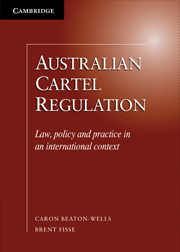Book contents
- Frontmatter
- Contents
- About the authors
- Preface
- Acknowledgements
- Abbreviations
- 1 Introduction
- 2 The legal framework governing cartel conduct
- 3 Collusion (contracts, arrangements, understandings)
- 4 Cartel and other provisions
- 5 Fault elements of the cartel offences
- 6 Individual liability for cartel conduct
- 7 Corporate liability
- 8 Exceptions
- 9 Enforcement policy
- 10 Immunity and cooperation policies
- 11 Sanctions
- 12 Compliance and liability control
- 13 Conclusion
- Appendix Trade Practices Act 1974 (Cth) Pt IV Div 1; Pt IV Div 2 s 45
- Index
1 - Introduction
Published online by Cambridge University Press: 05 December 2011
- Frontmatter
- Contents
- About the authors
- Preface
- Acknowledgements
- Abbreviations
- 1 Introduction
- 2 The legal framework governing cartel conduct
- 3 Collusion (contracts, arrangements, understandings)
- 4 Cartel and other provisions
- 5 Fault elements of the cartel offences
- 6 Individual liability for cartel conduct
- 7 Corporate liability
- 8 Exceptions
- 9 Enforcement policy
- 10 Immunity and cooperation policies
- 11 Sanctions
- 12 Compliance and liability control
- 13 Conclusion
- Appendix Trade Practices Act 1974 (Cth) Pt IV Div 1; Pt IV Div 2 s 45
- Index
Summary
Why focus on anti-cartel law and enforcement?
Over the last two decades the law applicable to cartel conduct and its enforcement have taken on a distinctive character within the broader field of competition law and enforcement. There has been a growing focus by governments, regulators and commentators on cartel activity, singled out as the most serious in economic terms of all anti-competitive conduct and as posing special challenges for detection and prosecution owing to its generally secretive and highly profitable nature. At international and national levels, there has been debate about how such conduct should be legally defined, including how to ensure that benign or welfare-enhancing collaborative activity between competitors is not caught by the legal proscriptions. There has also been debate about what types of sanctions are likely to be most effective in deterring such conduct, underscored by an emerging consensus that sanctions need to be tougher and may include criminal penalties for individuals. These developments have been accompanied by debate about the types of agencies charged with enforcement of anti-cartel laws, and the policies and powers necessary for detecting, investigating and prosecuting cartel conduct.
Consistently with this international focus, Australia's anti-cartel regime underwent a major overhaul in July 2009 with the amendments made to the TPA by the CC&OM Act. The overhaul was driven by a policy decision to criminalise serious forms of cartel conduct. However, in addition to the introduction of cartel offences, a new set of civil prohibitions was created, with associated changes to exceptions and penalty provisions. Investigatory powers were boosted and the model for enforcement reconstructed so as to accommodate the role of the CDPP as the agency that is responsible for prosecuting cartel offences, in conjunction with the ACCC as the investigatory and referral agency. Consequential changes to immunity and cooperation policies have been made. For the first time, the Federal Court of Australia has indictable criminal jurisdiction with significant procedural and evidentiary implications.
- Type
- Chapter
- Information
- Australian Cartel RegulationLaw, Policy and Practice in an International Context, pp. 1 - 9Publisher: Cambridge University PressPrint publication year: 2011



